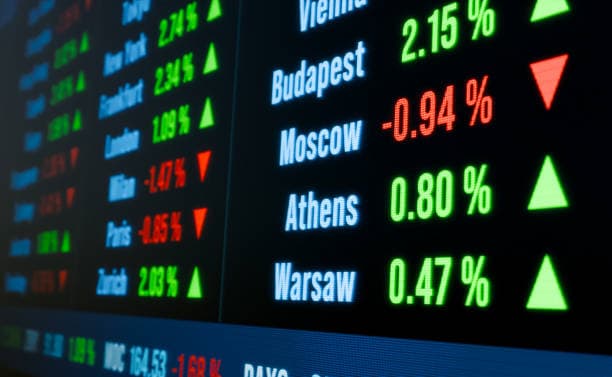Vast ocean of finance, one cannot help but be awestruck by the colossal waves of the global markets. Imagine the thrill of the trade, the rush of the deal, and the heartbeat of the markets – it’s a symphony of numbers and strategies that traders live for. But why is this global playground so essential for traders? Let’s dive in and find out.
The Pulse of the World: Understanding Global Markets
Global markets are the heartbeat of the world’s economy. They are where the world’s wealth is created, distributed, and transformed. These markets are not just a collection of stocks and bonds; they are a living, breathing ecosystem that reflects the health and vitality of the global economy. Traders need to understand this pulse because it dictates the rhythm of their trades.
The interconnectedness of global markets means that a trader in New York can be affected by a trade policy in Beijing or a natural disaster in Tokyo. This is why it’s crucial for traders to have a global perspective. They must be aware of the ripple effects that can occur in these markets.
Navigating the Global Trading Landscape
Trading in global markets is like navigating a vast ocean. You need a compass, a map, and a keen sense of direction. Traders must understand the different markets, their unique characteristics, and how they interact with each other. This knowledge is essential for making informed decisions and capitalizing on opportunities.
The diversity of global markets offers a wealth of opportunities for traders. From the tech-heavy NASDAQ to the resource-rich markets of Australia, each market has its own set of opportunities and challenges. Traders must be willing to explore these markets and adapt their strategies accordingly.
The Power of Diversification: Spreading Risks and Rewards
One of the key benefits of global markets (In Arabic, it is called “ماركت كوم“) is the ability to diversify investments. Diversification is like a shield for traders, protecting them from the concentrated risks of a single market. By spreading their investments across different markets, traders can mitigate the impact of a downturn in one area.
Moreover, diversification also opens up a world of opportunities. Traders can tap into the growth stories of emerging markets, the stability of developed markets, and the unique offerings of niche markets. This global spread allows traders to balance their risk and reward profile effectively.
The Role of Technology in Global Trading
In today’s digital age, technology has become the great equalizer in global trading. Platforms like Markets.com provide traders with the tools and resources they need to navigate the complex world of global markets. With advanced trading platforms, real-time data, and expert analysis, technology has made it easier than ever for traders to access and participate in global markets.
The advent of technology has also democratized trading, allowing individual traders to compete with institutional investors on a more level playing field. This has opened up new avenues for traders to explore and exploit.
The Influence of Geopolitics on Global Markets
Politics and markets have always been intertwined, but in today’s globalized world, the impact of geopolitics on markets is more pronounced than ever. Traders must keep a keen eye on political developments, as they can have a significant influence on market movements.
From trade wars to election outcomes, geopolitical events can create both risks and opportunities for traders. Being aware of these events and understanding their potential impact is crucial for making informed trading decisions.
The Importance of Cultural Sensitivity in Global Trading
As traders venture into global markets (In Arabic, it is called “الاسواق العالمية“), they must also be aware of the cultural nuances that can influence market behavior. Different markets have different norms, values, and practices that can affect how they operate.
Cultural sensitivity is not just about understanding these differences; it’s also about respecting them. By being culturally sensitive, traders can build stronger relationships with their counterparts in global markets and navigate the complexities of cross-border trading more effectively.
The Role of Regulation in Global Markets
Regulation plays a critical role in maintaining the integrity and stability of global markets. It sets the rules of the game and ensures that all players operate within a fair and transparent framework.
Understanding the regulatory landscape is essential for traders, as it can impact their strategies and operations. Compliance with regulations is not just a legal obligation; it’s also a way to protect their interests and maintain their reputation in the global trading community.
The Future of Global Markets: Embracing Change and Innovation
The global markets are constantly evolving, driven by technological advancements, changing economic landscapes, and new trading paradigms. Traders must be adaptable and open to change if they want to stay ahead in this dynamic environment.
Innovation is the lifeblood of global markets, and those who embrace it will be the ones who thrive. Whether it’s blockchain technology, artificial intelligence, or new trading algorithms, innovation is reshaping the way we trade and interact with global markets.
In conclusion, global markets are an essential playground for traders. They offer a world of opportunities, challenges, and complexities that can be both exhilarating and rewarding. By understanding the pulse of these markets, navigating their landscape, diversifying their investments, leveraging technology, being aware of geopolitics, showing cultural sensitivity, and embracing regulation and innovation, traders can position themselves for success in the global trading arena. So, strap on your trading boots, and let’s dive into the exciting world of global markets!







